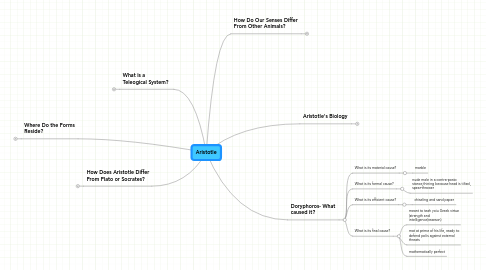Aristotle
da Sami Davis


1. How Does Aristotle Differ From Plato or Socrates?
1.1. Aristotle is a scientific and practical thinker.
1.2. Does not believe in world of the forms, thinks that everything we can understand are the things we can touch.
1.3. Creates and applies scientific model to philosophical investigation.
2. What is a Teleogical System?
2.1. Aristotle believed everything in this world (things that drive them to be create).
2.2. 4 Causes
2.2.1. material cause-material from which the thing is made of
2.2.2. formal cause-shape or form a thing must take in order to be recognized
2.2.3. efficient cause-actual force used to make things
2.2.4. final cause-what is the ultimate purpose of the thing
3. Where Do the Forms Reside?
3.1. Aristotle believes the forms lie inside the things themselves.
3.2. Example: form of oak tree is inside acorn.
3.3. Each thing we see is part of a teleological (goal oriented) system.
4. Aristotle's Biology
4.1. "All men by nature desire to know. An example is the delight we take in our senses."
4.2. Nature does nothing by chance. We have been given senses to use them to understand world.
4.3. To engage the problem of knowledge, we must begin with our senses.
5. How Do Our Senses Differ From Other Animals?
5.1. All forms of life have nutritive,reproductive,and locomotive power.
5.2. Animals differ by having the power of sensation and perception.
5.3. Complex animals have intellectual power(problem solving ability).
5.4. Humans have special intellectual power called reason (ability to comprehend universals).
6. Doryphoros- What caused it?
6.1. What is its material cause?
6.1.1. marble
6.2. What is its formal cause?
6.2.1. nude male in a contra-posto stance,thining because head is tilted, spear-thrower
6.3. What is its efficient cause?
6.3.1. chiseling and sand paper
6.4. What is its final cause?
6.4.1. meant to teah yoiu Greek virtue (strength and intelligence(reaeson)
6.4.2. mat at prime of his life, ready to defend polis against external threats
6.4.3. mathematically perfect
